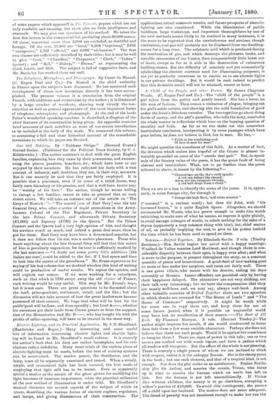A Child of the People, and other Poems. By James
Chapman Woods. (C. Began Paul and Co.)—The " child of the people" is a girl taken from the gutter and gently reared. She has a lover, an idle man of fashion. Then comes a visitation of plague, bringing out the girl's noble nature, and showing also the solid foundation of good under the lover's frivolous exterior. The two together go about doing deeds of mercy, and the girl's guardian, who tells the story, concludes the whole matter in reflections which bear on the burning question of morality and faith. As far as we can make out this somewhat inarticulate conclusion, interpreting it by some passages which have• gone before, he,does not believe in God, but in man. He has,— "Faith in the everlasting soul Of love in men for man!"
We might question the soundness of this faith. As a matter of fact, the devotion which makes him hopeful of the future is almost in- variably grounded on some of the "creeds that gall." But,,to speak only of the literary value of the poem, it has the great fault of being obscure and ivarticulate. What, not to go farther than the poem referred to above, is meant by the following ?— " Chancetimes on the sky's swift spindle A red sun tatters the shroud : Anon, ere the rainpools dwindle, A red bolt drops from a cloud."
Then we are at a loss to identify the scene of the poem. It is, appar- ently, in some foreign city, for through it
" Sweeps the high Host, 'mid white eseortal."
(" esoortal " is a curious word) ; but then Sir. John, with " his hocussed horses," is a quite English figure. Altogether, we. should recommend Mr. Woods, who has power enough to make him worth criticising, to make sure of what he means, to express it quite plainly, to avoid strange coinages of words, to admit nothing for the sake of a rhyme (apparently a very common thing with him), but, chief matter- of all, as probably implying the rest, to give to his poems tenfold the time which he has been used to spend on them.


































 Previous page
Previous page